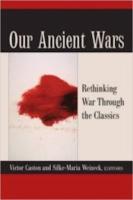
University of Michigan Press (2016) p/b 289pp £41.50 (ISBN 9780472052981)
There is an every growing interest in the use of classics as a means by which to explain the present day. Nowhere is this more true than in the exploration of war, or perhaps more specifically the experience of war. External disciplines have been using famous works the like of Homer, Aeschylus, and Plutarch, for instance, to try and help explore modern psychological and sociological tensions that are apparent with our modern day veterans. The clearest, and paradigmatic, version of this can be found in the influential works of the psychiatrist Dr. Jonathan Shay, who used Homer’s poems as a metaphor for the experiences and tribulations of the Vietnam veterans he was working with in his clinics. He used the ancient world to try and aid the understanding in, and of, the modern world. This has since had a knock-on effect; historians began to use the modern world as a way to explain the ancient world. It has become common place to lift modern notions of trauma, of mental illness, of atrocities, and supplant them into an alien, ancient world, disconnected by time, space and culture.
C./W.’s book is an edited volume which contains papers that walk a very fine line between using the ancient world as a tool to discuss modern issues and modern concepts, on the one side, and forcing modern ideas on the ancient world, on the other. The topics are interesting, and thought provoking, but the strong emphasis on classical Greek material shows just how far our discipline has yet to come in the study of ‘combat experience’ in the ancient world. The book is neatly structured, split into three sections and brought together by a thorough introduction and insightful epilogue.
Part 1 is entitled ‘Rethinking the Ancient, in View of the Modern’. The papers explore modern topics that will feel familiar: genocide, the home front, war guilt, and psychological endurance. A few of the authors go over work they have previously published on, but it is satisfying to be able to read these updated, and in tandem here. Sometimes the desire to explore modern ideas has meant that the writers have bypassed interesting, but purely contextual, questions that inevitably arise. An example would be S. Monoson’s article about the military experience of Socrates, in which she points out that Xenophon (a student of Socrates, and prolific writer on military matters) never once mentions Socrates’ own military record, unlike Plato who provides almost all of our evidence; yet Monoson does nothing to reconcile this strange omission. Why would an experienced general, who enjoyed telling the stories of veterans who inspired him, not mention the campaigns of his own teacher?
Part 2 is entitled ‘Rethinking the Modern, in view of the ancient’. In many ways following the precedent of Shay, many of these papers mix ancient and modern examples to explore a modern problem. The topics covered include Shay’s own model of ‘moral injury’; the lessons that war can give us; the decision making process to start a war. The final paper, written by P. Meineck, describes a successful theatre project, ‘Ancient Greeks/Modern Lives’, which puts on dramatic readings of Ancient Greek literature, aimed at an audience of veterans and veteran families.
Part 3 is entitled ‘Other Moderns, Other Ancients’, and is, I think, the most innovative and interesting of the collection. It explores the reception of certain ancient topics, how different periods have used them, including our own. The three topics are Homer’s Iliad, through four differing reception case studies, the character of Achilles himself, and finally the character of Spartacus, which incidentally introduces into this section the newest form of medium—film. The book is finished by a thoughtful Epilogue, written by W., which also lays out the aim for the volume, for scholars and soldiers to be able to talk to one another.
This book makes for an intensive read, but it is one to be recommended to teachers and scholars alike. Not for what it tells us of the ancient world, but as a source with which it is possible to find new ways of engaging a modern audience with the ancient world. Ultimately, getting people talking about real life and its social problems is important, especially if it means exposing people to ancient literature and the ancient world as a whole.
Owen Rees
